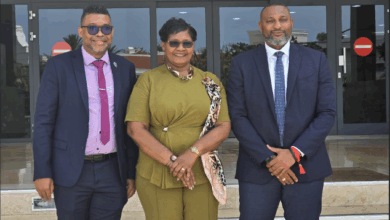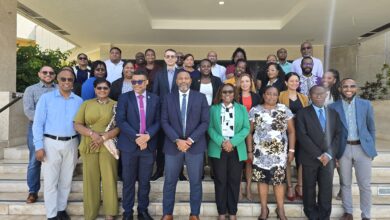(CARICOM Secretariat, Georgetown, Guyana) The Caribbean Community (CARICOM) Secretariat is taking the lead in inviting partnerships to strengthen the Caribbean Region's capacity for cultural resilience or renewal and to enhance the real economic gains accruing to regional economies and their people from their cultural resources. An interactive session dealing with the subject was convened by the CARICOM Secretariat in association with various Caribbean partner organisations on Tuesday (January 11) day two of the United Nations International Meeting on the Sustainable Development of Small Island Developing States (SIDS) in Mauritius.
The panel discussion titled, Vulnerability and Cultural Resilience in the Caribbean was moderated by Mr. Cletus Springer, Sustainable Development Consultant from Saint Lucia and featured presentations by Vice Chancellor Emeritus of the University of the West Indies (UWI), Caribbean scholar and cultural icon, Professor Hon. Rex Nettleford; Deputy Dean of Graduate Studies and Research at the UWI, St. Augustine campus, Dr. John Agard; and Senior Lecturer at UWI, Mona, Dr. Michael Witter.
Opening the event, CARICOM Secretary-General, His Excellency Mr. Edwin Carrington expressed the view that culture is not only the framework within which the socio-economic development of our societies can be successfully pursued, but also the effective tool for doing so in a sustainable way. He added that it was recognised in CARICOM that as the Community moves to establish a CARICOM Single Market and Economy (CSME), culture is central to economic and social development efforts in the Region. This, he said, can be seen from the place culture occupies in the Charter of Civil Society, which instrument is enshrined in the Revised Treaty of Chaguaramas, establishing the Community including the CSME.
“Caribbean Small Island Developing States faced with serious vulnerabilities recognise the potential of our culture to reduce their susceptibility to external shocks and to build their resilience to the dramatic changes and powerful intrusions of the current world economy and society,” Mr. Carrington noted. He added: “Indispensable to the building of this resilience is the forging of partnerships among the Caribbean peoples themselves both those at home as well as in the Diaspora. And this, even as we strike alliances with the rest of the world.”
The Secretary-General also used the occasion to pay tribute to the spirit and contributions of the late former Ambassador of Mauritius to Brussels, His Excellency Raymond Charles, who he described as a pioneer who struggled successfully to bring issues pertaining to culture and cultural cooperation within the discussions and agreements between the European Union (EU) and African, Caribbean and Pacific (ACP) States.
Mr. Carrington also expressed the deep regret felt by the Caribbean at the fact that plans and arrangements to have several top cultural groups and musicians from the Region perform at the cultural events associated with the SIDS conference and participate in the 'Community Vilaj' showcase fell through at the last minute because anticipated donor funding did not materialise.
Meanwhile, a presentation on Caribbean partnerships made to the forum by Programme Manager for Culture at CARICOM Sceretariat, Dr. Hilary Brown, disclosed that Caribbean SIDS required some US$16 million over four years to fund various projects for strengthening cultural capacity and putting in place institutional mechanisms and an enabling mechanism to promote the development of culture and cultural forms in a sustainable and economic way.
The availability of this long term financing, she pointed out, was critical to support the development of arts and culture in the Caribbean. The next steps in this regard include dialogue with organisations and potential partners to obtain support for the overall partnership and the development and elaboration of individual projects dealing with specific aspects of cultural development. Dr. Brown noted that currently CARICOM, the Caribbean Forum of ACP States (CARIFORUM), the CARIFORUM Support Fund, Caribbean Export and arts and culture agencies are funding various culture initiatives in the Caribbean.
In the feature presentation Professor Nettleford welcomed the placing of culture within a sustainable development framework, adding that sustainable development speaks to resilience or renewable resources and nothing is more renewable than the human mind. He pointed to some developmental interpretations that have placed factors like education and culture in the non-productive area of national development but drew attention to the increasing acceptance of the notion of cultural industries.
However, while the idea of cultural industries, professor Nettleford said, has evolved largely in terms of their critical linkage to what is regarded as the highly developmental tourist industry, the concept of culture having its own inner logic and consistency is still missing from the consciousness of many persons. Understanding culture in the Caribbean in the context of sustainable development, ecological integrity and environmental health, he pointed out, turns on the fact that human beings themselves are creatures of nature who are as endangered as mangroves, coastline habitats, birds and animals.
Human vulnerability and that of Caribbean small island states he noted, rests, among other things, on import dependency, lack of education, lack of opportunity for self development and self empowerment, the exploitation of labour, susceptibility to communicable or lifestyle diseases, lack of social services and material resources, and racism which leads to identity crises and denial of legitimacy to religious expressions such as Santeria, Zionism, Pukkumina and Rastafari.
“The way culture has formed in the Caribbean has ancestral pedigree,” Professor Nettleford declared, noting that Caribbean culture has emerged from the common history of a people over 500 years which included the experience of slavery and indentureship.
Dr. Witter gave an overview of the worsening economic risks which Caribbean SIDS have faced in the ten years since the Barbados Programme of Action for the Sustainable Development of Small Island Developing States, which mandated among other things, the development of indices of vulnerability. He pointed to the fact that since Barbados, SIDS have lost preferential markets on which they depended greatly for survival. He also drew attention to a phenomenon formerly known as the 'Singapore paradox', which he renamed in the Caribbean context, the 'Trinidad paradox'. This is a situation, he said, in which increased earnings, from oil in the case of Trinidad, has made the country even more prone or vulnerable to external shocks.
Additionally, Dr. Witter said, the vulnerability of Caribbean SIDS has worsened with what he described as the peculiar international exchange of human resources – the best migrating to the developed countries and the worst being deported back to Caribbean societies. He concluded that the Mauritius meeting must move towards deciding concrete strategies to enhance national efforts to build resilience.
The main thrust of the presentation by Dr. Agard was the fact that indices of social, economic, environmental vulnerability cannot be developed nor analysed separately as is currently the case. This, given the inextricable linkages among the areas, all of which he pointed out, was to advance human well being and reduce poverty especially as it concerns health and disease, environmental security, social service delivery and cultural security.
He explored statistical evidence that pointed to the critical linkages between environmental factors – from the increasing frequency of hurricanes to the depletion of coral reefs – and their impact on the goal of achieving human well being and economic development.
The Caribbean is participating in other activities pertaining to culture and social development as the Meeting continues throughout the week.
Contact:
Huntley Medley
Email: realhunter_1@yahoo.com





